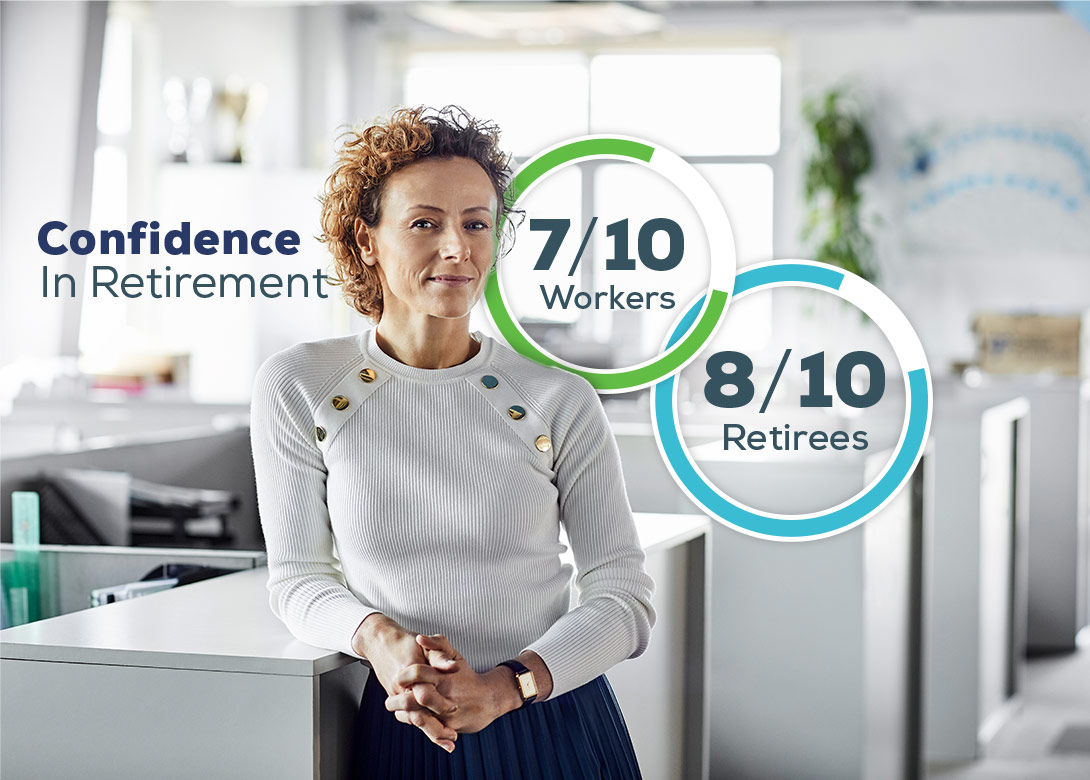Confidence in Retirement Security Resilient in Face of Pandemic
Confidence in Medicare, Social Security Benefits Reaches All-Time High, Workers Stay the Course with Retirement Plans
WASHINGTON – April 22, 2021 – Despite a global pandemic that created uncertainty in the employment and financial markets, the 2021 Retirement Confidence Survey (RCS) found eight-in-ten retirees are confident in their ability to live comfortably throughout retirement, similar to the 76 percent of retirees who were confident when the survey was last fielded in March 2020. Workers also remain optimistic, with 72 percent of workers expressing confidence in their ability to retire comfortably, up three percentage points from last year.
The 31st Annual RCS is the longest-running survey of its kind, measuring worker and retiree confidence about retirement. It is conducted by the Employee Benefit Research Institute (EBRI) and Greenwald Research. The RCS was fielded in January. Last year, the RCS was fielded twice – once in January prior to the COVID-19 outbreak and then re-fielded through a supplemental survey of key questions from March 20-30, 2020, allowing for comparisons before and during the pandemic.
“Even with changes in the labor market, workers’ confidence in their ability to live comfortably in retirement remains high overall,” said Craig Copeland, EBRI senior research associate and co-author of the report. “However, while resilience may be the watchword for 2021, three-in-ten workers say the pandemic has negatively impacted their ability to save for retirement, due to reduced hours, income, or job changes. The group that was most likely to have their ability to save impacted were those that were more likely to have low confidence historically, such as low income, not married, and having a problem with debt.”
Nearly two-in-ten (18 percent) workers said their hours and/or pay were reduced since February 1, 2020. One-in-ten workers said they were furloughed/temporarily laid off. In total, 39 percent of workers reported their household experienced some type of negative job or income change since February 1, 2020. However, 21 percent of workers did report having some type of positive change in work in the same timeframe.
Workers who had a negative change in work were more likely to say that the COVID-19 pandemic reduced their confidence in having enough money to live comfortably throughout their retirement years. Half of workers who had a negative change in work said that they were either somewhat or significantly less confident as a result of the COVID-19 impact, compared with just 24 percent of those who did not have a negative change.
Retiree Lifestyle and Expenses Largely Unchanged
Despite the challenges of 2020, retirees continue to report their lifestyle and expenses are as expected or better. Eight-in-ten retirees report that their overall lifestyle – including traveling, spending time with family, or volunteering – is as expected or better, including nearly three-in-ten saying their retirement lifestyle is better than they expected. Despite a challenging and unprecedented year, these results are virtually identical to those measured pre-pandemic, in January 2020. About six-in-ten retirees indicate their overall expenses and spending in retirement are as expected and just 26% say spending and expenses are higher than expected – a decrease from last year.
“About seven-in-ten retirees report that their confidence in living comfortably throughout retirement was unchanged by the pandemic; 23% feel less confident and five percent feel more confident,” said Lisa Greenwald, CEO of Greenwald Research, and co-author of the report. “Retirees’ top priorities for discretionary spending in retirement continue to be travel and spending on leisure or entertainment. Many of these activities were curtailed during the pandemic, perhaps leading to lower spending. That’s one reason why we may be seeing these results. Another is the adaptability and resilience of retirees demonstrated throughout the RCS’ history. The survey shows retirees prioritize asset preservation and do not like the idea of spending down.”
Pandemic Increases Retiree Confidence in Medicare and Social Security
“Also, Social Security – a ‘major’ source of income for more than six-in-ten retirees – continued uninterrupted during the pandemic,” added Greenwald. Confidence in Social Security continuing to provide benefits of at least equal value to those received today reached an all-time-high among both retirees (72%) and workers (53%). Three in four retirees and nearly six in ten workers are confident that Medicare will continue to offer benefits of at least equal value to those received today, an all-time high since the RCS was first fielded and remarkable in a year marked by mass health concerns, especially among older populations.
Workers Staying the Course and Satisfied with Workplace Retirement Plans
Only 22% of workers adjusted the age at which they plan to retire because of the pandemic and its economic impact, including 17% who plan to retire later. The RCS continues to demonstrate that workers expect to work in retirement, which is drastically different than the experience retirees report. Three-quarters of workers expect to work in retirement compared to just three-in-ten retirees who report doing so.
More than four-in-five workers who are offered a workplace retirement savings plan are satisfied with the benefit. Just three-in-ten report having made changes to their plan in the past year. Among those that did, six-in-ten say they increased the amount they contribute, while one-in-four each say they reduced or stopped contributions.
“Showing further resilience, just one-in-ten workers who have saved for retirement say they have taken a loan, hardship distribution or early withdrawal from their workplace retirement plan in the past 12 months,” says Copeland. “The most likely reasons for taking this money out were for paying off credit card debt, or for a COVID-related need.”
About four-in-five plan participants were satisfied with the investment options available, although three-in-ten say they would like more options available, an increase from 22% in 2020. A quarter of workers with a workplace retirement plan say adding more investment options designed for post-retirement would be valuable, and about three-quarters expressed some interest in putting a portion of their plan savings into an investment option that would provide guaranteed monthly income for life.
Diverse Communities Face Different Challenges
To better understand differences in retirement-related behaviors and attitudes among workers and retirees, this year’s RCS included oversamples of Hispanic and Black workers and retirees. The survey included 731 responses from those who identified as being of Hispanic, Spanish, or Latino origin (404 workers, 327 retirees) and 741 completed surveys from those who identified as non-Hispanic Black or African American (380 workers, 361 retirees). EBRI and Greenwald researchers will be conducting a fuller analysis of differences by race and ethnicity and will issue a separate report on those findings in June 2021.
About the Survey:
The survey report, The 2021 Retirement Confidence Survey, is available at ebri.org. The survey was underwritten by AARP, Aon, Ariel Investments, Ayco, Bank of America, BlackRock, Capital Group, Columbia Threadneedle, Empower Retirement, Fidelity Investments, FINRA Foundation, J.P. Morgan, LGIMA (Legal & General Investment Management America), Mercer, Mutual of America, Nationwide Financial, New York Life, PIMCO, Principal Financial Group, Prudential, PGIM, Retirement Clearinghouse, T. Rowe Price, Segal, U.S. Chamber of Commerce, and Wells Fargo.
The 2021 survey of 3,017 Americans was conducted online January 5 through January 25, 2021. All respondents were age 25 or older. The survey included 1,507 workers and 1,510 retirees – this year included an oversample of Black Americans and Hispanic Americans.
Data were weighted by age, sex, education, household income and race. Unweighted sample sizes are noted on charts to provide information for margin of error estimates. The margin of error would be ± 2.5 percentage points for both workers and retirees in a similarly-sized random sample.
About EBRI:
The Employee Benefit Research Institute is a private, nonpartisan, nonprofit research institute based in Washington, DC, that focuses on health, savings, retirement, and economic security issues. EBRI conducts objective research and education to inform plan design and public policy, does not lobby and does not take policy positions. The work of EBRI is made possible by funding from its members and sponsors, which include a broad range of public, private, for-profit and nonprofit organizations. For more information go to www.ebri.org.
About Greenwald Research:
Greenwald Research is a leading, independent research firm that has been specializing in retirement, employee benefits, and health care research for over 35 years. For more information, go to www.greenwaldresearch.com.







